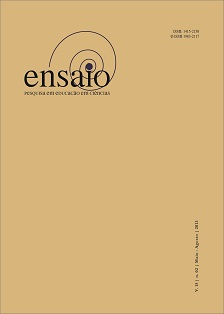INTERAÇÕES DISCURSIVAS EM PEQUENO GRUPO DURANTE UMA ATIVIDADE INVESTIGATIVA SOBRE DETERMINAÇÃO DA ACELERAÇÃO DA GRAVIDADE
DISCURSIVE INTERACTIONS IN A SMALL GROUP DURING AN INQUIRY-BASED ACTIVITY ON DETERMINING THE ACCELERATION OF GRAVITY
DOI:
https://doi.org/10.1590/1983-21172013150205Palabras clave:
Interação Discursiva; Pequeno Grupo; Atividade Investigativa.Resumen
A pesquisa em ensino de ciências tem mostrado a importância de estudos sobre os discursos presentes na sala de aula para a compreensão dos processos de ensino-aprendizagem. O propósito deste trabalho é analisar as interações discursivas que surgiram em um pequeno grupo de alunos de Ensino Médio durante a realização de uma atividade investigativa sobre determinação da aceleração da gravidade. Apresentamos os aportes teóricos em que nos baseamos e a técnica experimental utilizada, pelos alunos para realizar a experiência e descrevemos a atividade investigativa aplicada em sala de aula. A análise das falas de um dos grupos de alunos evidenciou a presença tanto de conversação acumulativa como de conversação exploratória entre eles. Além disso, identificamos, no discurso dos estudantes, questões de informação básica e também de alto nível cognitivo. Essas últimas contribuíram fortemente para a solução ao problema e foram formuladas por alunos que participaram pouco da discussão, o que nos levou a chamar a atenção para o papel que os estudantes que menos falam na interação em pequeno grupo podem ter para a resolução de problemas de caráter investigativo.
Research in science education showed the importance of studies about discourse in the classroom to understand the processes of teaching and learning. The aim of this study is to analyze the discursive interactions that have arisen in a small group of high school students during an inquiry-based activity on determining the acceleration of gravity. We present the theoretical framework used in the research, the inquiry- based activity proposed to the class and the experimental technique used by students to carry out the experiment. The analysis of the speeches of one students' group revealed the presence of both cumulative and exploratory conversation among them. Besides, basic information questions and wonderment questions were identified in the students' discourse. These wonderment questions had an important contribution to the solution of the problem and they were made by the students who had little participation in the discussion, which indicates the role these students may have to solve inquiry-based problems with their peers.
Referencias
AGUIAR, C. E. M.; MAXIMO-PEREIRA, M. Using the Sound Card as a Timer. The Physics Teacher, v 49, p. 33-35, 2011.
AGUIAR, O.; MORTIMER, E. F.; SCOTT, P.Learning from and responding to students' questions: the authoritative and dialogic tension. Journal of Research in Science Teaching, v 47, n. 2, p. 174-193, 2010.
AZEVEDO, M. C. P. S. Ensino por investigação: problematizando as atividades em sala de aula. In: CARVALHO, A. M. P.(Org). Ensino de Ciências. São Paulo: Pioneira Thomson Learning, p. 19-33, 2004.
CANDELA, A. Ciencia en el aula. Los alumnos entre la argumentacióny el consenso. Cidade do México: Paidós, 1999. 299 p.
CAZDEN, C. B. Classroom discourse: the language teaching and learning. 2. ed., Portsmouth: Heine mann, 2001. 216 p.
CHIN, C.; BROWN, D. Student-generated questions: A meaningful aspect of learning in science. International Journal of Science Education, v. 24, p. 521-549, 2002.
DANIELS, H. Vygotsky e a pedagogia. Trad. Milton Camargo Mota. São Paulo: Edições Loyola, 2003. 246 p.
EDWARDS, D.. El papel del professor en la construcción social del conocimiento. Revista Investigación en la Escuela. v. 10, p. 33-50, 1990.
HODSON, D. In search of a meaningful relationship: an exploration of some issues relating to integration in science and science education. InternationalJournal of Science Education, London, v 14, n. 5, p. 541-566, 1992.
JIMENEZ ALEIXANDRE, M. P. 10 ideas claves, competencias en argumentación y uso de pruebas. Barcelona: Graó, 2010. 200 p.
LEMKE, J. L. Talking science: language, learning, and values. Norwood, New Jersey: Ablex Publishing Corporation, 1990. 276 p.
MEHAN, H. Learning Lessons. Cambridge, MA: Harvard Press, 1979. 227 p.
MENDONÇA, D. H. Atividade discursiva em sala de aula contribuições das perguntas dos estudantes na construção de conhecimento científico. 2010. Dissertação (Mestrado em Educação) - Faculdade de Educação, Universidade Federal de Minas Gerais, Belo Horizonte, 2010.
MERCER, N. La construcción del conocimiento: El habla de profesores y alumnos, Barcelona: Paidós, 1997. 144 p.
MORTIMER, E. F.; SCOTT, P. Atividade discursiva nas salas de aula de ciências: uma ferramenta sociocultural para analisar e planejar o ensino. Investigações em Ensino de Ciências. Porto Alegre, v. 7, n. 3, p. 283-306, 2002.
MORTIMER, E. F.; SCOTT, P. H. Meaning making in secondary science classrooms. Maidenhead: Open University Press, 2003, 141 p.
NEWMAN, D.; GRIFFIN, P.; COLE, M. The Construction Zone, working for Cognitive Change in School. New York: Cambridge University Press, 1989. 188 p.
ROTH, W. M. Talking science, language and learning in science classrooms. Nova Iorque: Rowman & Littlefield publishers Inc, 2005. 256 p.
VIGOTSKI L. S. Formação social da mente. São Paulo: Martins Fontes, 2007. 182 p.
VIGOTSKI, L. S. Aconstrução do pensamento e da linguagem. 2. ed., São Paulo: WMF Martins Fontes, 2009, 494 p.


